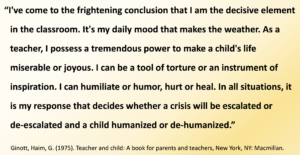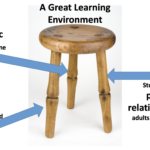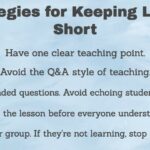Reclaiming Teacher Autonomy Through Choice
One of the most devastating effects of the standardization movement—with its pressures to conform and emphasis on accountability through high-stakes testing—has been the stripping of teacher autonomy—our power to make informed decisions about how best to meet the needs of our students. As we have been forced to adopt scripted curricula, we have been robbed of our voice and professionalism, sometimes feeling as though we must blindly follow district mandates or hollow curricula regardless of the needs of the actual children in front of us. This can lead us, as teachers, to feel powerless and ineffective.
This is particularly disturbing in light of research that highlights that teacher efficacy influences teachers’ resiliency, openness to new ideas, persistence, and patience with students who struggle. In The Well-Balanced Teacher, I explore the importance of teacher autonomy as one of the critical elements of a positive connection with the profession. Now, in my latest book, Learning to Choose, Choosing to Learn, I offer a way for us to recapture our sense of autonomy, even within the context of tight (and even scripted) curricula.
We know that our students are often more motivated to do school work when they have some choice in their learning, but sometimes choice can feel overwhelming. It is hard enough to prepare one lesson or activity for our students, let alone coming up with multiple options. This is one of the reasons differentiation can feel so daunting. However, choice doesn’t need to be so hard. In fact, sometimes even the simplest of choices can help support true student ownership of work while helping them self-differentiate their learning. Consider a couple of examples . . .
Students are deepening their understanding of a new math concept and are practicing articulating how the concept works. They can either solve a few problems and write explanations about the process on note cards, or they can play “ESPN math” (where one student solves a problem and another provides a play by play, articulating what the other student doing.)
Students are learning about a historical period. They choose a topic within that period on which to conduct a small research study and then create a simple two-dimensional project about the topic. These projects all displayed on a classroom wall to help enrich the learning of the class.
Students are balancing equations in chemistry. They choose problems from their textbook to solve that provide a “just right” level of challenge. Then, they each choose one problem they solved to explain to a partner.
Of course, there are a vast array of ways we might offer students choices about their learning. Students might choose where in the room to work, whether they want to learn on their own or with a partner, what data to collect to practice graphing, which short story to read to examine story elements, and so many more.
Regardless of the kind of choice we offer students, I have a few suggestions for getting the most out of choice (while also keeping it manageable).
- Use choice with purpose. Make sure not to give choice simply to give choice; rather, offer options that will truly help engage learners.
- Offer good choices. Effective choices should meet three criteria: they should connect with learning goals, they should match student interests and needs, and they should fit within realistic class logistics (time, resources, etc.).
- Don’t just give choices, teach students how to choose. Teach students strategies for making good choices. Help them develop skills of self-refection and metacognition so they can become more skilled at making effective decisions about their learning.
I was just recently working in a school in Massachusetts to help teachers implement choice throughout daily curricula. Over and over again, teachers talked about how much their students were enjoying choice—even really simple choices blended into the lessons they were already teaching. They shared how much more focused and engaged their students were when they used choice. They also talked about how much more energized they felt as teachers. In fact, in one small group, a teacher pounded her fist on the table and declared, “I’m retiring at the end of this year, and after this work we’ve been doing, I don’t want to retire anymore!”
So, are you looking to reclaim some of your passion and positive spirit for teaching? Consider finding ways to offer your students some meaningful choices about their learning. You and your students will likely find more positive engagement in school!
Click here for some inspiring free ASCD resources to share to keep you fueled up to continue your good work.
This blog post was first published on the ASCD Inservice blog: http://inservice.ascd.org/reclaiming-teacher-autonomy-through-choice/





